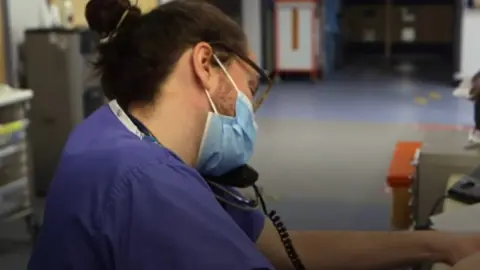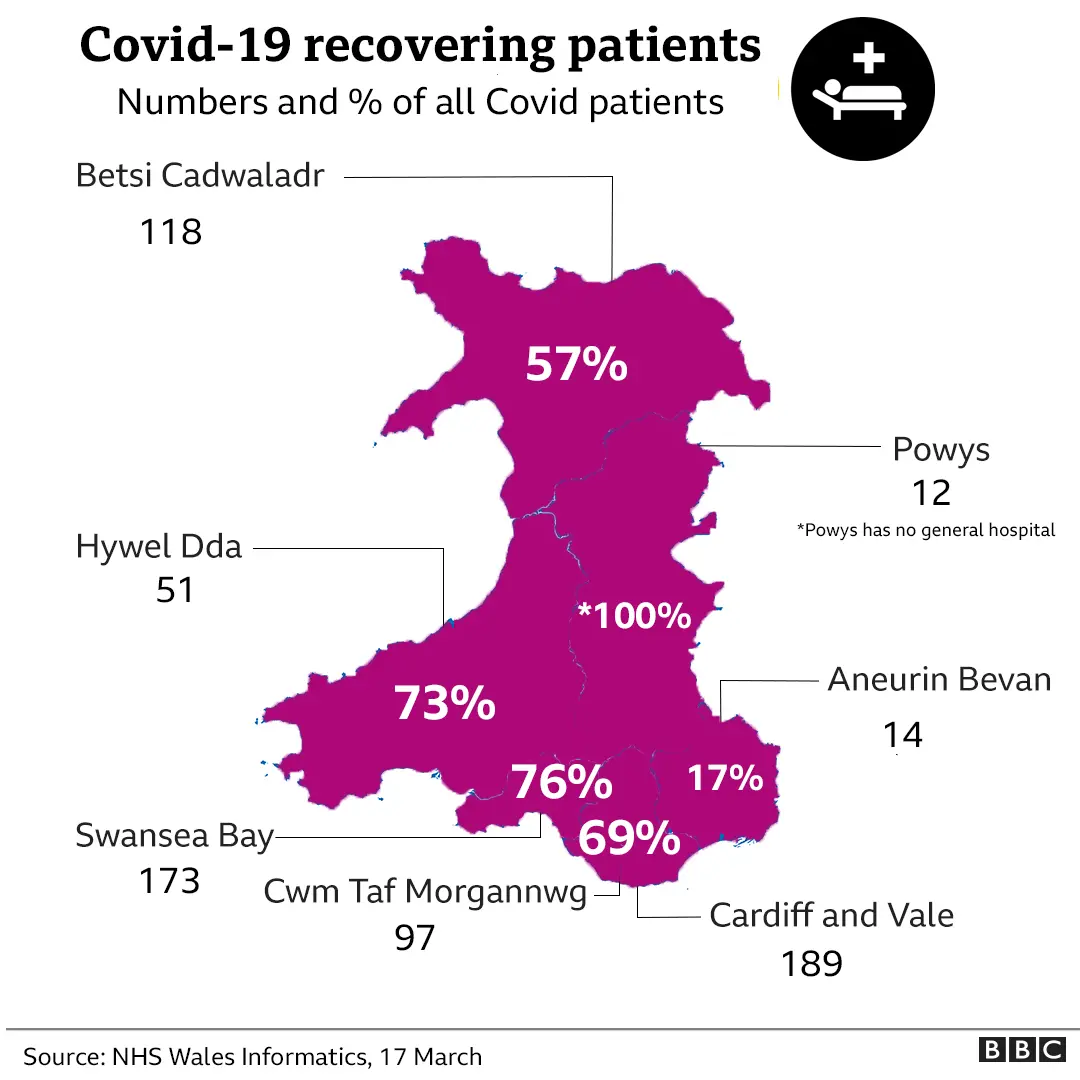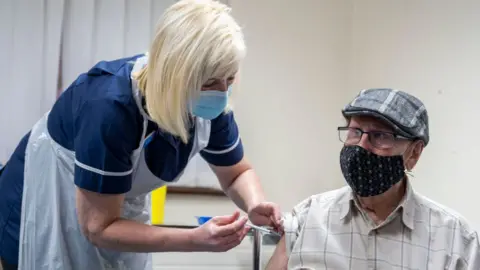Covid-19: Royal Glamorgan hospital sees zero admissions with virus
 BBC
BBCOn four days during the last week, there were no patients admitted to hospitals in the Cwm Taf Morgannwg area with Covid-19.
For the first time since September, the Royal Glamorgan Hospital near Llantrisant had no adult patients with confirmed or suspected Covid in its beds either.
Managers say the milestone has led to a "real lightening of the mood" and was a tribute to the efforts of staff and the community.
Rachel Burton, the health board's director of operations for the Rhondda Taf Ely area, said although the hospital was not back to normal the news had led to a "slightly upturned face this morning" after some difficult weeks at the start of the year.
Managers are now seeing patients who have been with them for a long time who are well enough to go home, as well as much smaller numbers of cases coming in.
"Consultants are commenting now that their clinics feel like original clinics, they're seeing patients with things other than Covid," she said.
"They're back to operating on patients who have got other concerns and conditions that need their attention."
On Monday, there were only 24 admissions for Covid across Wales. This was the lowest daily number yet recorded during the pandemic.
The daily average for Covid admissions - 37 in the week up to Tuesday - is also at a record low for the pandemic.
Cwm Taf Morgannwg saw no admissions at all on Monday or Tuesday - and two other days in the last seven days.

Hundreds of patients still recovering from Covid
But as Covid numbers fall across Welsh hospitals, there are still hundreds of patients classed as recovering from Covid-19.
In Cwm Taf Morgannwg, these amount to more than three-quarters of all its Covid patients, with a similar proportion in Swansea Bay.
The lowest proportion is in Aneurin Bevan (less than a fifth), but the Wales average is two-thirds of all Covid patients are recovering patients. That is 654 of the 991 Covid patients at Wales' main hospitals.
At the height of the second wave at the end of January, the number was closer to 1,200 recovering patients.
A "recovering" patient is officially someone who had had Covid but has not tested positive for the virus for 14 days. If they are too unwell to go home, they stay in hospital.
At Royal Glamorgan, these include patients with underlying health conditions made worse by Covid, and have a longer recovery time and rehabilitation needs.
But there have also been issues, particularly at the peak, of being able to discharge elderly patients due to Covid outbreaks and staff sickness within care homes, or the complexities of arranging the right care packages for people to get help at home, while they adapt and recover.
'Taking its time'
Rhondda Cynon Taf is an area already known for its health issues, associated with deprivation and its mining history.
"It isn't that all patients have been severely affected by Covid and that is delaying their discharge, it's more that it's impacted on an existing condition that's causing us problems," said Ms Burton.
"By and large, people with underlying health conditions have had a more severe outcome from their Covid infection and that is taking its time."
'Ready to go'
"We want to be sure that we return people to their care setting in as good a state as possible. We don't want people to go home, and then very quickly come back to us for obvious reasons.
"So we're taking our time, and we're making sure that we're getting everything right before they go, which is inevitably meaning that some people are having slightly longer stays with us."
In Swansea Bay, there is a similar mix of patients suffering from the after-effects of the virus or in rehab.
"Some will have recovered from the virus but have other clinical issues preventing discharge, such as hip fractures," said a health board official.
"Some will be ready to go clinically but need social care in the community or require a rehab bed that is not yet available."
These patients are mostly over 50 years of age. Some will not be able to be discharged yet because the effect of Covid has changed their ability to manage back at home.
Some are waiting for extra care support to be ready in their own homes or residential accommodation.
What was the impact of Covid in Cwm Taf Morgannwg?
At the peak of the second wave, there were more than 700 patients in hospital beds in the area, which included more than 300 recovering patients and bosses admitted it was more challenging than the first.
There were more patients too in critical care than during the height of the first wave.
At Royal Glamorgan, there were four wards full of Covid patients at the peak.
"Staff were already fatigued from the first wave and knew what was coming, so that played into anxieties," said Rachel Burton.
"In the first wave, there was a little bit of the unknown, so it was it was very, very difficult, combined with the fact that things are always a little bit harder in the winter, and we get additional winter pressures anyway. "
The health board area, which has three general hospitals, has seen 1,574 deaths so far during the pandemic, with 1,100 of these in the second wave since September. Around 320 of these have been in hospitals since January, with 44% of them in Rhondda Cynon Taf (RCT).
The county, with 871 deaths, has the fifth highest mortality rate for its population size, across England and Wales.
Health managers believe the community has played its part in the dramatic reduction in Covid case numbers. Just four positive tests were reported on Wednesday.
"There are a few people who don't know somebody, whether a neighbour or family member or work colleague, and hasn't been directly affected in some way from this," said Ms Burton.
"When we went back to really stressing the need to follow the public health guidance of social distancing, hand-washing, face coverings and so on, we've seen really good compliance in that across areas and I think that that has made a difference."
 Getty Images
Getty ImagesWhat about the vaccine and the future?
Royal Glamorgan bosses believe anecdotally they might now be seeing the positive effect of the vaccination among the older and more vulnerable groups.
"We're thinking now that we are seeing less people coming in and hoping that that is a result of the vaccination programme, which has been successful for us," said Ms Burton.
"We continue obviously, to promote and encourage our population to take up the vaccine."
There is "light at the end of the tunnel" and the hospital is making in-roads into its recovering patients.
"One or two patients are going every day, so within the next couple of weeks, hopefully we'll see that number reduce and go back to zero."
